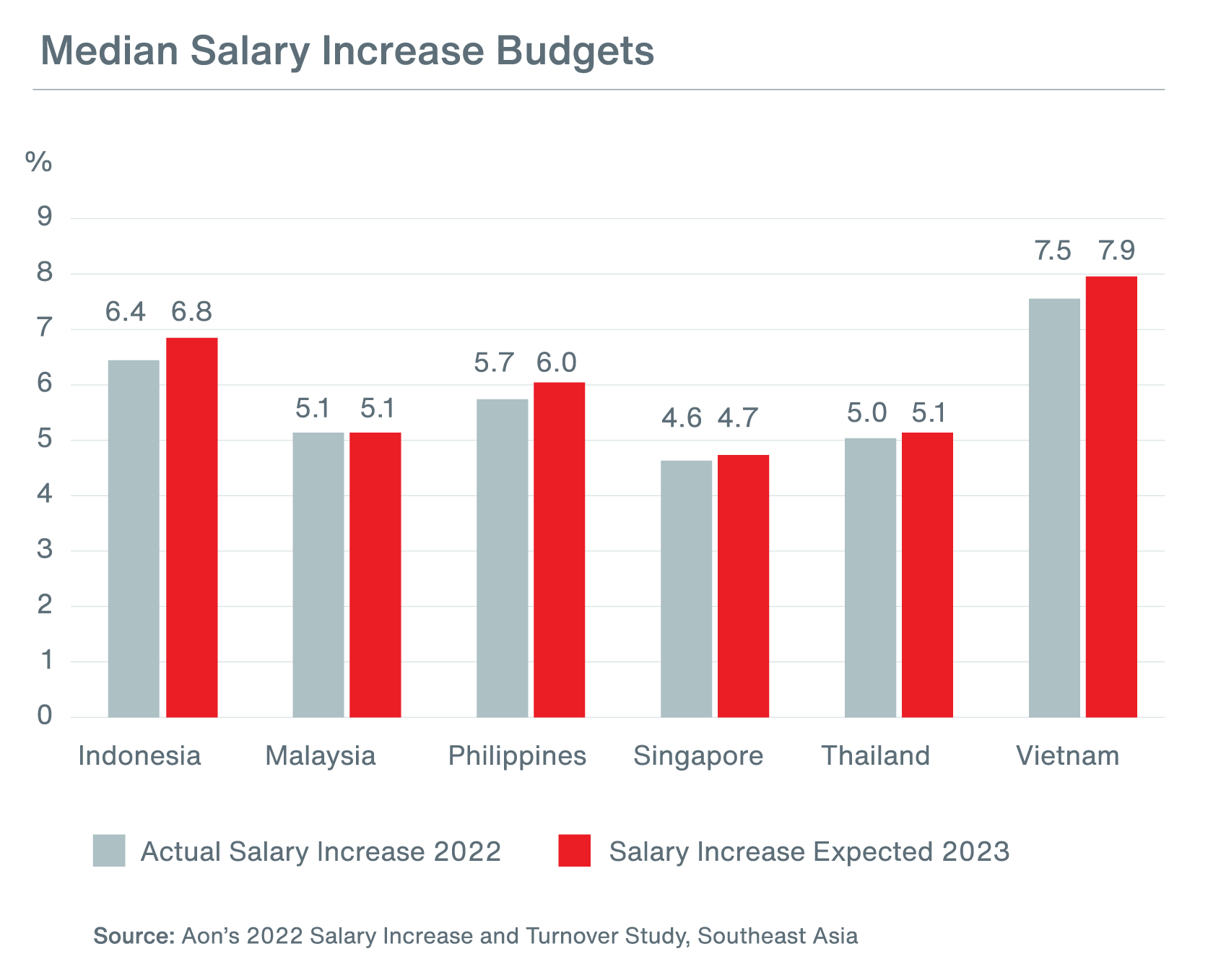Salaries in Southeast Asia Expected to Increase in 2023, Aon Survey Reveals
- Written by Telegraph Magazine
SINGAPORE - Media OutReach - 8 December 2022 - Aon plc (NYSE: AON), a leading global professional services firm, today released insights from its 2022 Salary Increase and Turnover Study for southeast Asia (SEA), revealing that salaries in the region are expected to increase slightly for 2023 compared to 2022.
The study was conducted in the third quarter of 2022, surveying the salary changes and turnover rates of more than 700 companies across Indonesia, Malaysia, the Philippines, Singapore, Thailand and Vietnam.
Median salary increase budgets are forecasted across industries at 6.8 percent for Indonesia 5 .1 percent for Malaysia, 6 percent for the Philippines, Singapore at 4.7 percent, 5.1 percent for Thailand and 7.9 percent for Vietnam. 
While inflation plays a significant role in how salary changes look across the region, they are also driven by supply and demand in the talent market. High attrition rates across southeast Asia in 2022 are putting pressure on firms to use compensation measures to tackle hiring and retention challenges: 15.9 percent in Indonesia, 14.9 percent in Malaysia, 18 percent in Philippines,19.6 percent in Singapore, 15.4 percent in Thailand and 15.2 percent for Vietnam.
Rahul Chawla, partner and head of Human Capital Solutons for southeast Asia at Aon said, "While it is critical for businesses to define and adapt pay for different worker types and the nature of the work, organisations must stay agile as they rethink their pay principles. Businesses need to shape their strategies towards long-term drivers of pay and performance by making changes in a phased manner to optimise pay effectiveness. In addition, companies must define their 2023 salary increase approach in the context of the competitiveness of their current salary levels and employee value proposition. Companies that adopt a skill-based compensation programme will help ensure they can continue to build future skills for their organisation's resilient workforce."
The survey further revealed that salary increases in 2022 varied across industries across the region, with the retail industry having the highest increases (6.5 percent), followed by technology and life sciences (6.1 percent) and financial institutions (5.9 percent). The ongoing technology and digital skills shortage across the region as a consequence of firms competing to accelerate transformation and drive their digital initiatives resulted in higher year on year increases in salaries and total compensation for technology and data analytics roles compared to others. However, with the recent reports of a potential global economic slowdown, firms are taking a cautious approach and focusing on salary increases for selected employee groups or levels as they navigate a volatile and uncertain environment.
Alina Cheng, senior consultant, Human Capital Solutions for southeast Asia at Aon said, "With the rise of fintech and digital banks in the region, roles in areas such as risk, compliance and talent acquisition are in demand. Firms are paying a premium to attract new talent at the junior and middle management levels for these roles. As a result, over the past two years, we have seen compensation structures shifting towards lesser variable and pay at risk and an increased focus on salaries.There is no one-size-fits-all approach for developing a salary increase strategy in a volatile environment. Employers must constantly analyse the market, study the available data and contextualise the unique circumstances of their industry and organisation to make better and more informed decisions."
To access the study visit 2022 Salary Increase and Turnover Study. More information about Aon in Asia is available here.
Hashtag: #Aon
The issuer is solely responsible for the content of this announcement.
About Aon
Aon plc (NYSE: AON) exists to shape decisions for the better — to protect and enrich the lives of people around the world. Our colleagues provide our clients in over 120 countries/territories with advice and solutions that give them the clarity and confidence to make better decisions to protect and grow their business.
Follow Aon on Twitter and LinkedIn. Stay up-to-date by visiting the Aon Newsroom and sign up for News Alerts here.











